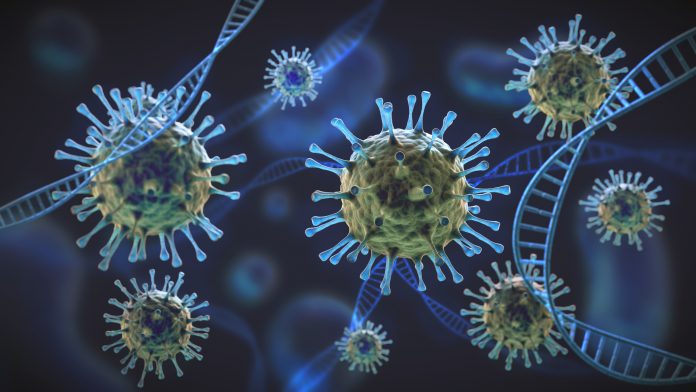
A variant that reduces the risk of SARS-CoV-2 infection by 40% has been identified by a team led by researchers at the Regeneron Genetics Center. This finding also provides evidence that angiotensin-converting enzyme 2 (ACE2) expression levels influence COVID-19 risk.
The study was published in Nature Genetics this week. The lead author is Julie E. Horowitz of the Regeneron Genetics Center.
The team also confirmed the associations of six previously reported risk variants, of which four were further associated with worse outcomes in individuals infected with the virus (in/near LZTFL1, MHC, DPP9 and IFNAR2). Further, they also showed that common variants define a risk score that is strongly associated with severe disease among cases and modestly improves the prediction of disease severity relative to demographic and clinical factors alone.
SARS-CoV-2 enters human host cells through ACE2 receptors. Reported risk factors for severe COVID-19 include male sex, older age, ethnicity, obesity and cardiovascular and respiratory diseases. Host genetic factors are known to modulate the risk of infection and disease severity. However, there is not yet a clear understanding of genetic susceptibility to SARS-CoV-2 infection and progression to severe disease.
The largest human genetics study performed so far included data from 49,562 individuals infected with the virus and more than 1.7 million individuals with no record of infection as controls. That project identified 13 independent common risk variants, (Niemi, MEK, et al, Nature, 2021).
Those researchers conducted three genome-wide association meta-analyses in 46 studies across 19 countries. Several of the loci they found were previously linked to lung or autoimmune and inflammatory diseases. Some of these loci were located in or near immune-related genes, such as IFNAR2 and CXCR6. Genetic studies of rare variation, using exome or genome sequencing, have also suggested a role in COVID-19 for genes in the type 1 interferon (IFN) pathway, including TLR7.
In this Regeneron Genetics Center-Led study, researchers found that one variant (rs190509934, minor allele frequency 0.2–2%) downregulates ACE2 expression by 37% (P = 2.7 × 10−8 and reduces the risk of SARS-CoV-2 infection by 40% ). Their study also showed that among six previously reported risk variants, four were further associated with worse outcomes in individuals infected with the virus (in/near LZTFL1, MHC, DPP9 and IFNAR2).
To help further identify genes that might underlie the observed associations, the team searched for functional protein-coding variants (missense or predicted loss of function) in high LD (r2 > 0.80) with each variant. They found eight functional variants in five genes: IFNAR2, a cytokine receptor component in the antiviral type 1 IFN pathway, which is activated by SARS-CoV-2 and is dysregulated in cases with severe COVID-19; CCHCR1, a P-body protein associated with cytoskeletal remodeling and messenger RNA turnove; TCF19, a transcription factor associated with hepatitis B; and C6orf15 and PSORS1C1, two functionally uncharacterized genes in the MHC.
The team performed GWAS of COVID-19 outcomes across 52,630 individuals with COVID-19 and 704,016 individuals with no record of SARS-CoV-2 infection aggregated from 4 studies (Geisinger Health System (GHS), Penn Medicine BioBank (PMBB), UK Biobank (UKB) and AncestryDNA. Of the cases with COVID-19, 6,911 (13.1%) were hospitalized and 2,184 (4.1%) had severe disease; hospitalized patients were more likely to be older, of non-European ancestry and to have preexisting cardiovascular and lung disease.













